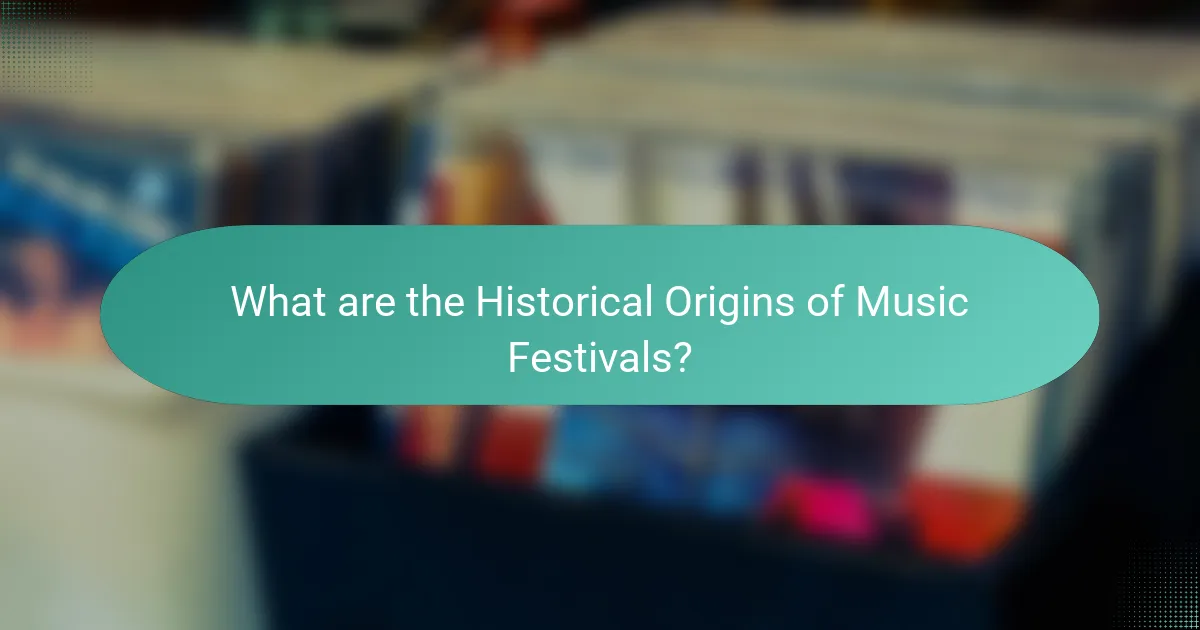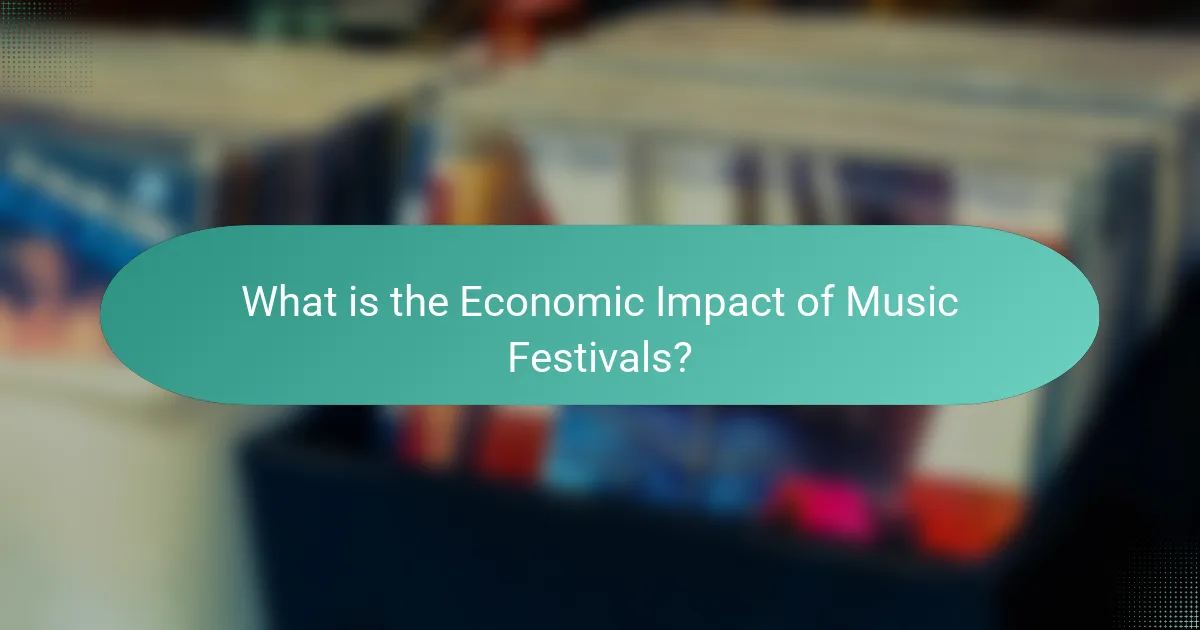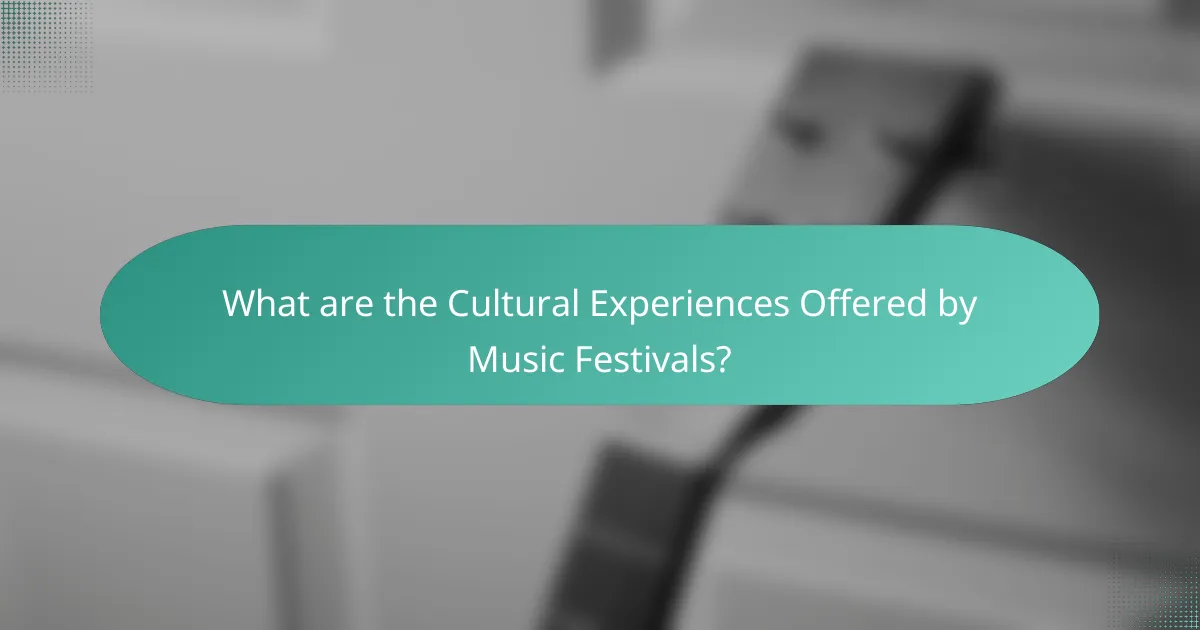Music festivals are large-scale events centered around live performances, often rooted in historical traditions tied to religious and seasonal celebrations. This article explores the evolution of music festivals from their origins in ancient Greece to their modern-day significance, highlighting their economic impact through tourism and local business revenue. It examines how festivals like Woodstock have shaped cultural experiences and social movements, fostering community engagement and cultural exchange. Additionally, the article discusses the diverse genres represented at these festivals and their role in enhancing local economies and cultural vibrancy.

What are the Historical Origins of Music Festivals?
Music festivals originated in ancient times, often linked to religious and seasonal celebrations. These events featured music as a central element to honor deities or mark significant agricultural milestones. The earliest documented music festivals can be traced back to ancient Greece, particularly the Dionysia festival, which celebrated the god Dionysus with performances of tragedies and comedies. In the Middle Ages, music festivals evolved in Europe, with events like the Feast of Fools incorporating music into communal celebrations. The 20th century saw a significant transformation, as festivals like Woodstock in 1969 popularized large-scale music gatherings. Today, music festivals are a global phenomenon, showcasing diverse genres and attracting millions of attendees annually.
How did music festivals begin and evolve over time?
Music festivals began in ancient times, with early examples found in Greece and Rome. These festivals celebrated religious events and featured music, dance, and theatrical performances. Over time, music festivals evolved to include various genres and cultures. The 20th century saw a significant increase in popularity, particularly in the 1960s with events like Woodstock. Woodstock attracted over 400,000 attendees, showcasing the potential scale of music festivals. Today, festivals span genres and attract millions globally, contributing significantly to local economies. Major festivals like Coachella and Glastonbury generate millions in revenue and foster cultural exchange. The evolution reflects changing societal values and the growing importance of live music experiences.
What were the first known music festivals and their significance?
The first known music festivals include the ancient Greek Dionysia and the Roman Ludi. The Dionysia, held in Athens, celebrated the god Dionysus with dramatic performances and music. This festival was significant for its role in the development of Western theatre and music. The Roman Ludi, which included various games and performances, showcased music and entertainment in public spaces. These early festivals fostered community engagement and cultural expression. They laid the groundwork for the modern music festival concept, emphasizing the importance of music in social and cultural contexts.
How did cultural movements influence the growth of music festivals?
Cultural movements significantly influenced the growth of music festivals by shaping their themes and audiences. The counterculture of the 1960s, for example, led to iconic festivals like Woodstock. These events focused on peace, love, and music, attracting diverse crowds. The punk movement in the 1970s introduced festivals that emphasized rebellion and DIY ethics. In the 1990s, the rave culture brought electronic music festivals to prominence, highlighting community and escapism. Each cultural movement created unique spaces for expression and connection. This evolution reflects societal changes and the desire for communal experiences. Festivals became platforms for political statements and artistic freedom. The influence of cultural movements continues to shape the music festival landscape today.
What role did technology play in the development of music festivals?
Technology significantly shaped the development of music festivals by enhancing sound quality and audience experience. Innovations in sound engineering allowed for larger venues and more complex audio setups. The introduction of portable sound systems enabled festivals to occur in diverse locations. Lighting technology improved visual effects, creating immersive environments for attendees. Online ticketing systems streamlined entry processes and increased accessibility. Social media platforms facilitated marketing and community engagement for festivals. Streaming technology expanded the reach of festivals to global audiences. These advancements collectively transformed music festivals into major cultural events.
How have advancements in sound and lighting transformed music festivals?
Advancements in sound and lighting have significantly transformed music festivals by enhancing the audience experience. Improved sound technology allows for clearer audio delivery across large crowds. Innovations like line array speakers distribute sound more evenly, reducing distortion. Enhanced lighting systems create immersive environments that engage attendees. LED technology enables vibrant colors and dynamic effects synchronized with performances. These advancements also facilitate elaborate stage designs, attracting larger audiences. Data from the International Music Summit indicates that enhanced production values increase ticket sales and overall festival attendance. Such technological progress has redefined the atmosphere and engagement levels at music festivals.
What impact did the internet and social media have on music festival promotion?
The internet and social media revolutionized music festival promotion by increasing accessibility and engagement. Artists, promoters, and fans can now connect instantly through platforms like Facebook and Instagram. This connectivity facilitates real-time updates and announcements regarding lineups and ticket sales. Social media allows for targeted advertising, reaching specific demographics effectively. User-generated content, such as videos and photos, amplifies festival visibility and creates buzz. According to a 2019 report by Eventbrite, 95% of festival-goers discover events through social media. This data underscores the significant role social media plays in festival promotion. Overall, the internet and social media have transformed traditional marketing strategies into dynamic, interactive campaigns.

What is the Economic Impact of Music Festivals?
Music festivals generate significant economic impact through tourism, job creation, and local business revenue. They attract thousands of attendees, boosting hotel bookings and restaurant sales. For instance, the Coachella Valley Music and Arts Festival contributes over $700 million to the local economy annually. Additionally, music festivals create temporary jobs in event management, security, and hospitality. Local vendors also benefit from increased sales during festivals. Studies indicate that for every dollar spent by festival attendees, approximately $3 is generated in local economic activity. Thus, music festivals play a vital role in enhancing community prosperity and cultural vibrancy.
How do music festivals contribute to local economies?
Music festivals contribute to local economies by generating significant revenue through tourism and related spending. They attract large crowds, which boosts local businesses such as hotels, restaurants, and shops. For instance, the 2019 Coachella Valley Music and Arts Festival generated an estimated $403 million for the local economy. Festivals create job opportunities in various sectors, including hospitality and event management. They also promote local artists and vendors, enhancing community engagement. Furthermore, festivals can lead to long-term tourism growth by establishing the area as a cultural destination. Overall, music festivals serve as a catalyst for economic development in their host communities.
What are the key economic benefits for host cities?
Host cities experience significant economic benefits from music festivals. Increased tourism is a primary advantage, as festivals attract visitors from various regions. These visitors spend money on accommodations, dining, and local attractions. For example, a study by the National Endowment for the Arts found that festivals can boost local economies by millions of dollars. Job creation is another benefit, with temporary employment opportunities arising in hospitality and event management. Additionally, music festivals enhance local business visibility, fostering long-term economic growth. Overall, the influx of visitors and spending contributes to a vibrant local economy.
How do music festivals create job opportunities and stimulate local businesses?
Music festivals create job opportunities and stimulate local businesses by attracting large crowds and generating economic activity. They require staffing for security, vendors, and event management. Local businesses benefit from increased sales in hospitality, retail, and transportation sectors. According to a study by the National Endowment for the Arts, festivals can lead to a 30% increase in local revenue. Additionally, festivals often hire local artists and service providers, further boosting the local economy. This influx of visitors also encourages investment in infrastructure and community services. Overall, music festivals serve as a catalyst for economic growth in their host communities.
What are the financial challenges faced by music festivals?
Music festivals face several financial challenges. High production costs, including artist fees, venue rentals, and equipment, strain budgets. Unpredictable weather can lead to reduced attendance and revenue. Sponsorship reliance creates risk if partners withdraw. Ticket sales fluctuations can impact cash flow. Regulatory fees and insurance add to expenses. Economic downturns can decrease discretionary spending on entertainment. These factors collectively threaten the financial viability of music festivals.
How do ticket sales and sponsorships affect festival profitability?
Ticket sales and sponsorships significantly impact festival profitability. Ticket sales generate direct revenue for the festival. Higher ticket prices can lead to increased profit margins. Sponsorships provide additional funding, often covering operational costs. This financial support allows festivals to invest in better facilities and talent. According to a study by the Event Marketing Institute, 84% of event organizers report that sponsorships are crucial for profitability. Festivals with diverse revenue streams, including ticket sales and sponsorships, tend to be more financially stable. Overall, both elements are essential for maximizing profitability in music festivals.
What risks do organizers face in terms of weather and attendance?
Organizers face significant risks related to weather and attendance at music festivals. Adverse weather conditions can lead to safety hazards, such as flooding or extreme heat. These conditions may force cancellations or delays, impacting the overall experience. Attendance can be affected by weather forecasts, with potential attendees often choosing to stay home during inclement weather. Historical data shows that festivals held in rainy conditions can see attendance drop by as much as 30%. Additionally, poor weather can lead to increased costs for organizers due to additional safety measures and refunds. Therefore, weather-related risks directly influence attendance and financial outcomes for festival organizers.

What are the Cultural Experiences Offered by Music Festivals?
Music festivals offer diverse cultural experiences that celebrate various musical genres and traditions. They serve as platforms for cultural exchange among attendees from different backgrounds. Festivals often feature local artists, showcasing regional music styles and cultural heritage. This promotes community engagement and supports local economies. Attendees experience food, art, and crafts that reflect the local culture. Interactive workshops and performances enhance cultural appreciation. Music festivals also foster social connections, creating a sense of belonging among participants. Historical examples, like Woodstock, highlight the cultural significance of music festivals in shaping societal movements.
How do music festivals foster community and cultural exchange?
Music festivals foster community and cultural exchange by bringing diverse groups together in a shared environment. These events create opportunities for social interaction among attendees from various backgrounds. Festivals often feature artists from different cultures, promoting cross-cultural understanding. Attendees experience a variety of musical genres, which can introduce them to new cultural practices. The communal atmosphere encourages collaboration and networking among participants. Research shows that music festivals can enhance local economies and strengthen community ties. For example, a study by the National Endowment for the Arts found that festivals stimulate local businesses and promote tourism. In essence, music festivals serve as a platform for cultural dialogue and community building.
What unique cultural experiences can attendees expect at music festivals?
Attendees at music festivals can expect diverse cultural experiences that reflect various artistic expressions. Festivals often showcase local traditions through performances, food, and art. Many festivals feature artists from different genres and cultural backgrounds, promoting cross-cultural exchange. Attendees can participate in workshops that teach traditional crafts or dance forms. Cultural exhibitions often highlight regional history and customs. Festivals may also include interactive installations that engage attendees in unique ways. The immersive environment fosters community and shared experiences among diverse groups. These elements create a rich tapestry of cultural engagement that enhances the festival experience.
How do music festivals promote diversity and inclusivity?
Music festivals promote diversity and inclusivity by featuring a wide range of artists from various backgrounds. This diversity in performers encourages attendees from different cultures and communities to participate. Festivals often include programming that highlights underrepresented genres and artists, such as women, [censured] individuals, and artists of color. For instance, festivals like Coachella and Glastonbury have made concerted efforts to diversify their lineups over the years.
Additionally, many festivals implement initiatives to create a welcoming environment. This includes accessible facilities and programming aimed at fostering community engagement. Research shows that diverse lineups can enhance audience experiences and increase attendance. According to a 2020 study by the National Endowment for the Arts, diverse cultural programming attracts broader audiences.
Moreover, festivals often collaborate with local organizations to promote inclusivity within their communities. This engagement helps to build bridges between different cultural groups. By providing platforms for diverse voices, music festivals contribute significantly to the cultural landscape.
What are the social benefits of attending music festivals?
Attending music festivals enhances social connections and community bonding. These events foster a sense of belonging among attendees. People often meet others with similar interests, facilitating friendships. Festivals promote cultural exchange through diverse musical genres and performances. Shared experiences at concerts create lasting memories and strengthen social ties. According to a study by the University of California, music festivals improve social well-being and reduce feelings of isolation. Additionally, festivals often encourage collaboration and teamwork among participants, enhancing social skills.
How do music festivals enhance social connections and networking?
Music festivals enhance social connections and networking by creating shared experiences among attendees. These events gather diverse groups of people with similar interests in music. The atmosphere encourages interaction and conversation, breaking down social barriers. Attendees often meet new friends through communal activities and performances. Networking opportunities arise through collaborations and connections made during the festival. Research indicates that 75% of festival-goers report making new friends at events. Additionally, many professional relationships develop in this vibrant setting. The unique environment fosters a sense of community and belonging, vital for social bonding.
What role do music festivals play in personal and collective identity formation?
Music festivals play a significant role in personal and collective identity formation. They provide a space for individuals to express their unique identities through music and shared experiences. Festivals often foster a sense of belonging among attendees who share similar musical tastes and cultural values. This communal environment enhances social connections, reinforcing group identities. Research shows that music festivals can create lasting memories, which contribute to personal narratives and self-concept. For instance, studies indicate that participants often reflect on their festival experiences as pivotal moments in their lives. These events also serve as platforms for cultural expression, allowing diverse identities to be showcased and celebrated.
What are some best practices for attending music festivals?
Arrive early to secure a good spot and familiarize yourself with the venue layout. Stay hydrated by drinking plenty of water throughout the day. Wear comfortable clothing and sturdy footwear to endure long hours of standing and walking. Bring essential items like sunscreen, a portable charger, and ear protection to enhance your experience. Plan your schedule by checking the lineup and setting priorities for performances. Be mindful of your belongings and consider using a fanny pack or secure bag. Respect the festival rules and fellow attendees to maintain a positive atmosphere. Finally, be open to new experiences and enjoy the diverse offerings of the festival.
How can attendees prepare for a successful festival experience?
Attendees can prepare for a successful festival experience by planning ahead. They should research the festival schedule and lineup. Knowing the performance times helps in prioritizing must-see acts. Attendees should also pack essentials like water, snacks, and sunscreen. Staying hydrated and protected from the sun is crucial for comfort. Comfortable clothing and footwear are important for mobility. Festivals often involve long hours of standing and walking. Familiarizing oneself with the festival layout can save time. This includes locating stages, restrooms, and food vendors. Lastly, having a backup plan for meeting friends is wise. Connectivity can be limited in crowded areas.
What tips can enhance enjoyment and safety at music festivals?
Stay hydrated by drinking plenty of water throughout the festival. Dehydration can lead to fatigue and health issues. Wear appropriate clothing for the weather to ensure comfort. Comfortable shoes are essential for long hours of standing and walking. Establish a meeting point with friends in case you get separated. This ensures everyone can regroup easily. Keep your valuables secure and avoid bringing unnecessary items. This reduces the risk of loss or theft. Be mindful of your surroundings and respect personal space. This enhances the overall experience for everyone. Familiarize yourself with the festival layout, including emergency exits and medical stations. Knowing where to go in case of an emergency is crucial for safety. Lastly, plan your schedule to include breaks and downtime. This prevents burnout and allows you to enjoy the performances fully.
The main entity of this article is music festivals, which have evolved significantly from their historical origins to become major cultural events today. The article explores the historical roots of music festivals, tracing back to ancient Greece and Rome, and highlights their transformation through various cultural movements, particularly in the 20th century. It examines the economic impact of music festivals on local economies, job creation, and tourism, while also discussing the cultural experiences they offer, including community engagement and diversity. Additionally, the article addresses the role of technology in enhancing festival experiences and the social benefits of attending these events.